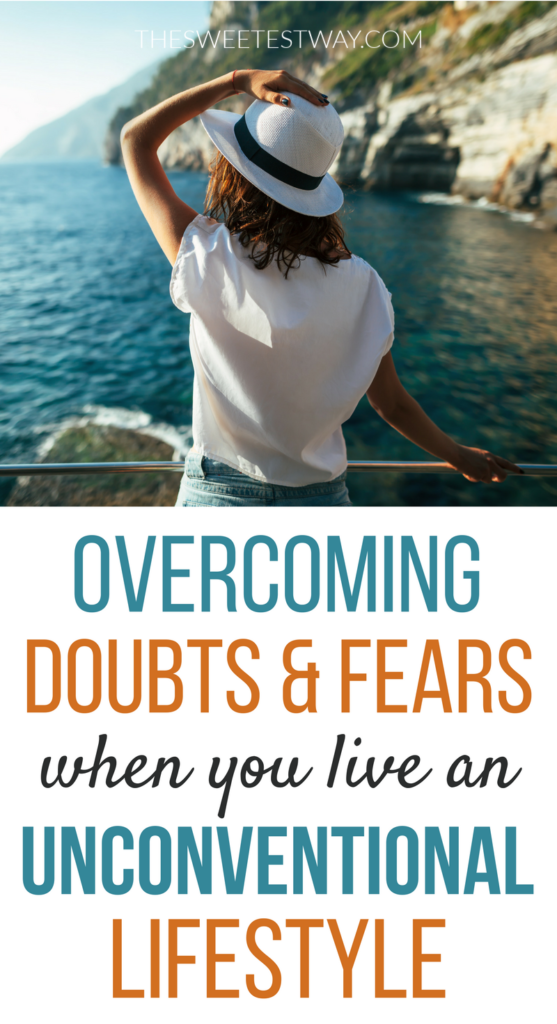We’re all faced with doubts and fears in our daily lives–it’s not only normal but often necessary to help us move forward.
But when fear stands in the way of pursuing the lifestyle we really want, it’s time to get up, get empowered, and put those loser fears in their place.
Unconventional lifestyles like location independence come with their own unique set of fears and doubts, which requires tackling them in unique ways.
If you’re not yet living the life you’ve been dreaming of because of these common fears, may this post provide you with the tools and the knowledge you need to move forward confidently.
If you’re living the life you imagined but feel as though fear is still keeping you from reaching your full potential, this is your call to break through that barrier and start making magic.
Here's how to overcome doubts and fears when living an unconventional lifestyle #workfromanywhere Click To TweetFear #1: Your network won’t support your lifestyle
We’ve all heard the stories of people living alternative lifestyles–whether as digital nomads, entrepreneurs, artists, or freelancers–whose families won’t stop asking things like:
- When are you coming home?
- When are you going to settle down?
- When are you going to get a real job?
- When are you going to quit messing around and grow up?
This type of attitude toward anyone who rejects the status quo in favor of pursuing an unconventional lifestyle is unfortunately quite common in our society today.
And whether the people asking those questions know it or not, this type of interrogation can be frustrating, hurtful, and downright counterproductive.
Furthermore, it can damage relationships in ways that are difficult to repair, and it can create crippling self-doubt for the person being questioned.
We may start to second-guess our own choices, letting others’ opinions cloud our judgment and forgetting why we chose this sort of lifestyle in the first place.
This is especially true when it’s coming from people we admire and trust–they haven’t steered us wrong in the past, so how could they be wrong this time?
If you’ve experienced this situation or are fearful of encountering it when you make your own transition to a life less ordinary, here are a few things to keep in mind:
Only you know what’s best for you.
You know your own heart’s desires better than anyone else. Don’t be afraid to stand up for your convictions, for what you know in your heart to be the best path for you.
We all have our own inner compass and when we pay close attention to it, it very rarely steers us astray.
It is not your responsibility to make others understand your lifestyle.
There will always be naysayers who doubt the feasibility of your lifestyle. There will always be defeatists who are so scared to take charge of their own life that they feel the need to bring others down, too.
Whether or not they understand the inner workings of your lifestyle or why you chose it in the first place is really no concern of yours.
You don’t own an explanation to anyone, especially if their only motive is to try to tear you down.
It’s okay to cut ties with toxic people.
If unsupportive people are standing in the way of you reaching for your dreams, cut that cord, baby. Ain’t nobody got time for negativity, condescension, or anything else that doesn’t help you become your best self.
Friends lift each other up and support each other’s goals in life, regardless of whether they “get it” or not. If there are people in your life that do not fit this criterion, it’s time to (unapologetically) say goodbye.
Fear #2: You won’t be able to relate to your friends anymore
When I first began blogging and freelancing in 2014, I had been abroad for so long at that point that I’d already lost touch with many of the people I’d grown up with.
We’d still see each other occasionally, but it often felt like we could no longer connect in any meaningful way. Our paths had diverged too far from one another and we didn’t have much of anything in common anymore.
A few friends proved to be the exceptions to this rule and we’ve maintained a relationship even though I still spend much of my time abroad, working, or most certainly not thinking about having babies or buying a house.
But I realized that these unusual lifestyle choices I was making would continue to make me less relatable to the people I once held so dear.
I love to travel, and I do so frequently. I am my own boss and work from home. I don’t own a house (or much of anything for that matter) and possessions don’t mean a whole lot to me. I have no plans to have children.
In so many ways, my lifestyle is completely opposite of the lifestyle my friends have chosen and trying to remain close began to feel like mixing oil and water.
Eventually, I had to make peace with this fact and seek support and friendship elsewhere.
If you’ve experienced something similar, know that it’s perfectly natural to fall out of touch with certain people and that neither one of you are bad people or bad friends because of it.
Remember these important points the next time you feel a relationship losing momentum:
Everything has a season, including the people in our lives.
Perhaps the most beautiful part of life is the impermanence of all things. In accordance with the natural order of life, friendships, too, inevitably fade.
I believe each person comes into our lives for a very specific purpose; to teach us a lesson about life or about ourselves (just as our presence serves a purpose to them). They become a part of our story and help us on our journey.
And when the time is just right for them to leave our lives once again, they’re gone, but never forgotten. Be grateful for the opportunity to know them and accepting when your season together is over.
When you lose touch with someone, it’s not personal.
Your mind may try to concoct a story that places blame on you for the end of a friendship. Don’t give this thought any power–the mind is your worst enemy, and it will try to bring you down if you let it.
Friendships end because life is marching onward. You both have new opportunities entering your lives, and you’re both evolving into new people.
Old habits, old personalities, and old friendships simply have to make way for the new.
Fear #3: Your family will fear for your safety abroad
Not all of us were born into families full of world travelers; for some people, the world feels like a terrifying place full of monsters lurking in the shadows, waiting to harm you at the first opportunity.
When these people happen to be your family members, your decision to travel or live abroad can seem to them like an irresponsible, dangerous choice.
And we don’t want to upset our family, right? We don’t want to feel responsible for their worries and stress, so we might begin to question our decision to travel knowing that it distresses the people we care about.
But here’s the thing: a worrier will find a reason to worry no matter the circumstances. It’s what worriers do!
When someone is fearful of the big, wide world, it’s usually because it’s unfamiliar to them. They haven’t traveled themselves, and what they don’t know scares them.
There is often no rationale behind their fear, no true cause for alarm. And as such, the onus is on the worrier to overcome their worries–but, there is plenty we can do to help this process along.
Communicate with them as often as they need.
To assuage your loved ones’ fears, it’s helpful to set up regular communication so they know you’re safe and sound.
It will help them rest easier at night to hear your voice and know you’re happy and healthy, and you’ll feel better knowing they’re not worried about your wellbeing ’round the clock.
My family was apprehensive when I first moved overseas, but over time and with enough reassurance, they began to relax. But even still, I use Skype to keep in touch regularly no matter where I travel or for how long.
Share the details of your life abroad–the more they know about it, the better they’ll feel.
In addition to chatting regularly, be sure to share what you’re up to and what you’re experiencing to provide a full picture of your daily life abroad.
Send photos of your living quarters, your workspace, the friends you meet, and the places you go.
Familiarizing them with your reality on the ground will provide much-needed peace of mind (and maybe even inspire them to visit you!).
Remind them that safety is never guaranteed, whether at home or abroad.
When you look at the statistics, travel is actually a pretty safe bet for Americans: TIME reports that on average, out of the 68 million Americans that travel abroad each year, a mere 827 die of unnatural causes.
That’s the same as roughly eight days worth of automobile deaths in the US.
The reality is, there are dangers everywhere, and travel-related deaths for Americans remain pretty darn low. And don’t even get me started on gun violence in the United States–personally, I’d take my chances overseas!
Fear #4: Your income may be variable and inconsistent
Depending on the type of work you pursue in your unconventional path, this fear may be very real for you.
Which path to location independence is right for you? Take the quiz!
When you’re building a career from scratch, income will not likely come pouring in right from the start, and even once you’re established, it may vary wildly from month to month.
And no one wants to imagine what might happen should they run out of money abroad (or anywhere, really).
I have experienced this fear both past and present. It is yet another certainty of self-employment, at least in the beginning.
But some of the time, this fear is actually quite beneficial. The fear of going broke can be an excellent motivator to work harder and make things happen so you’ll never have to experience that worst case scenario.
It can force you to think more creatively, coming up with new ways to generate income that you may not have thought of otherwise.
But we don’t want to live with this fear forever–we choose unconventional lifestyles for the freedom they can provide, not so we wind up back where we started, shackled to a computer and working 90-hour weeks.
Here are a few suggestions to alleviate the fear that comes from an unpredictable paycheck:
Keep a healthy amount of money in savings in case of emergency.
Ideally, you’ll have built up a financial cushion well before leaving the comfort of a salaried job. This is one of the best ways to ensure you’ll be able to weather low-earning months as a new freelancer or entrepreneur.
If not, try to stash away some money each month, especially during periods where earnings are plentiful. It’s never a good idea to spend everything you make in a month since unforeseen expenses will invariably pop up.
If you’re particularly risk-averse, get a remote job.
If you’re interested in pursuing a location independent lifestyle but want the security of a regular paycheck, why not get a remote job instead of striking out on your own?
If the freedom to work from anywhere is all you’re after, this is a low-risk way to explore this new lifestyle.
You can always transition to something else down the road by building it up first as a side hustle while you still hold your remote job.
Learn how to budget properly and make it a priority.
The best way to ensure you’re not overspending is to set a monthly budget for yourself and do your best to stick to it.
Determine how much you can reasonably spend on accommodation, food, transport and other expenses based on how much you’re earning.
Websites like NomadList and The Earth Awaits are great resources to help you find cities around the world that fit your budget and that offer the type of lifestyle you want to live.
Fear #5: You’ll never be able to find someone willing to date you
Hoo boy, I felt this fear big time. Constantly moving from place to place and always dreaming of the next destination can make it difficult to form any relationships at all, much less romantic ones.
Even if you’re not constantly traveling, the entrepreneur or freelancer lifestyles can make relationships difficult to navigate as well.
Odd working hours and an inability to ever truly disconnect from your work can make you something of an anomaly to people that exist outside of this world.
You’re definitely putting yourself in a tough situation here if a meaningful partnership is something you’re after, but it certainly doesn’t mean you’re destined to die alone.
And I know this from experience–I got engaged just last year to a man who isn’t location independent himself, nor self-employed.
I really did it, you guys! I found love and made it work–and we’re committed to making it work for the long haul.
Through this process, the number one thing I’ve realized about relationships when living an unconventional lifestyle is:
Compromise. Is. Literally. Everything.
Compromise will form the backbone of your relationship, so you better get comfortable making sacrifices now.
For example, if you travel frequently and the other person doesn’t, you’ll have to reach some sort of agreement that works for both of you.
Perhaps you travel less, or you find a way to travel together. Maybe you create a home base together, or maybe you both take your lives on the road.
If you’re worried your lifestyle will keep you from finding real love, here are a few tips:
Let go of any expectations of what your life should look like.
When you meet that special someone, your life will inevitably change (for the better!).
So it’s important for you to be flexible when it comes to your future–you’ll have someone else’s lifestyle and preferences to consider (if you want them to stick around, anyway) which means you won’t be able to do whatever you want anymore.
Let it ride, my friend!
You may not do all the things you thought you would do, or in the same time frame, and that’s okay. You’ll begin building a better future, together. One that reflects both of your goals, dreams, and plans.
Keep in mind that they will be making their own set of sacrifices for you in order to make it work. Remember–it’s all about compromise!
Make sure you’re ready to prioritize someone else’s happiness above your own.
This is a big one, and it can help you know whether you’re ready for a real commitment or if you’re still content flying solo.
If you’re not ready to put someone else’s needs and wants ahead of your own, then you might not be in a place to make a relationship work.
This is true for anyone, but particularly if your lifestyle is atypical.
Get ready to work different hours of the day so the two of you can spend quality time together. Be prepared to endure some distance in your relationship if one or both of you like to travel.
Reconcile now with the fact that your world doesn’t revolve around you anymore. A relationship centered around giving is a relationship that will stand the test of time.
Don’t rule out people who are currently living a different lifestyle than you.
I’ll be honest with you guys–I never imagined I would end up with someone who lived such a different lifestyle from my own.
I figured I’d meet another blogger or a digital nomad at the very least, and we’d work similar schedules and have similar jobs and everything would just flow.
But as it turns out, love doesn’t work that way. You can’t choose who you fall in love with, and you can’t engineer your ideal mate in a factory.
Far more important than a shared lifestyle are shared values. Mutual Respect. Kindness. Appreciation.
So don’t rule someone out just because their current lifestyle doesn’t perfectly mirror your own. Lifestyles can change–yours included.
What fears and doubts have you encountered while pursuing an unconventional lifestyle? How do you tackle them?



